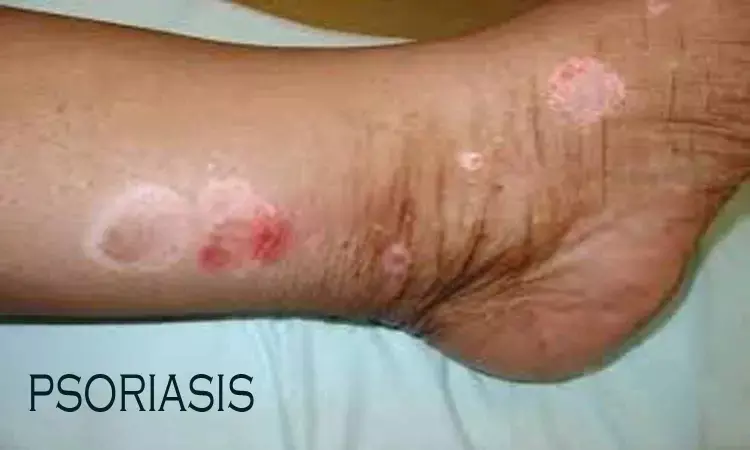- Home
- Medical news & Guidelines
- Anesthesiology
- Cardiology and CTVS
- Critical Care
- Dentistry
- Dermatology
- Diabetes and Endocrinology
- ENT
- Gastroenterology
- Medicine
- Nephrology
- Neurology
- Obstretics-Gynaecology
- Oncology
- Ophthalmology
- Orthopaedics
- Pediatrics-Neonatology
- Psychiatry
- Pulmonology
- Radiology
- Surgery
- Urology
- Laboratory Medicine
- Diet
- Nursing
- Paramedical
- Physiotherapy
- Health news
- Fact Check
- Bone Health Fact Check
- Brain Health Fact Check
- Cancer Related Fact Check
- Child Care Fact Check
- Dental and oral health fact check
- Diabetes and metabolic health fact check
- Diet and Nutrition Fact Check
- Eye and ENT Care Fact Check
- Fitness fact check
- Gut health fact check
- Heart health fact check
- Kidney health fact check
- Medical education fact check
- Men's health fact check
- Respiratory fact check
- Skin and hair care fact check
- Vaccine and Immunization fact check
- Women's health fact check
- AYUSH
- State News
- Andaman and Nicobar Islands
- Andhra Pradesh
- Arunachal Pradesh
- Assam
- Bihar
- Chandigarh
- Chattisgarh
- Dadra and Nagar Haveli
- Daman and Diu
- Delhi
- Goa
- Gujarat
- Haryana
- Himachal Pradesh
- Jammu & Kashmir
- Jharkhand
- Karnataka
- Kerala
- Ladakh
- Lakshadweep
- Madhya Pradesh
- Maharashtra
- Manipur
- Meghalaya
- Mizoram
- Nagaland
- Odisha
- Puducherry
- Punjab
- Rajasthan
- Sikkim
- Tamil Nadu
- Telangana
- Tripura
- Uttar Pradesh
- Uttrakhand
- West Bengal
- Medical Education
- Industry
Use of some biologics increase risk of serious infections in psoriasis patients: JAMA

France: A new study by Laetitia Penso and colleagues reported that the risk of serious infections is increased in new users of infliximab and adalimumab versus etanercept in patients with moderate to severe psoriasis.
The study further found that ustekinumab users had a lower risk of having a serious infection but not new users of apremilast or IL-17 and IL-23 inhibitors.
The findings of the study, published in the journal JAMA Dermatology, could help physicians to choose a biologic for patients with psoriasis at risk of serious infections.
Psoriasis is an immune-mediated disease that gives rise to multiple infections. Biologics and targeted therapies, such as apremilast are efficient for the management of moderate to severe psoriasis. However, there is a need for more information on the risk of serious infection for the newest treatment options in a real-world setting.
To fill this knowledge gap, the researchers assessed the risk of serious infection among biologics and apremilast used to treat psoriasis, with etanercept as the comparator.
The study was designed as a nationwide cohort study from France involving data from the National Health Data System covering approximately 99% of the French population. All adults with psoriasis, defined as receiving at least 2 prescriptions of a topical vitamin D derivative within a 2-year period, registered in the database between January 1, 2008, and May 31, 2019, were eligible. The study population included those who were new users of biologic agents or apremilast (ie, without any prescriptions of a biologic or apremilast during the previous year). Patients with HIV infection or a history of cancer, transplant, or serious infection were excluded. The end of the follow-up was on January 31, 2020.
Out of a total of 44 239 new users of biologic treatment were identified (mean age, 48.4 years; 22 866 men; median follow-up, 12 months [interquartile range, 7-24 months]).
The results of the study were found to be:
• A total of 29 618 (66.9%) were prescribed a tumor necrosis factor inhibitor first, 6658 (15.0%) an interleukin (IL) 12/23 inhibitor, 4093 (9.3%) an IL-17 inhibitor, 526 (1.2%) an IL-23 inhibitor, and 3344 (7.6%) apremilast.
• The total number of serious infections was 1656, and the overall crude incidence rate was 25.0 per 1000 person-years. The most frequent serious infections were gastrointestinal infections (645 patients [38.9%]).
• After adjusting for time-dependent covariables, the risk of serious infections was higher for new users of adalimumab (wHR, 1.22) or infliximab (wHR, 1.79) vs etanercept, whereas ustekinumab was associated with a lower risk of having a serious infection (wHR, 0.79).
• Risk of serious infections was not increased for new users of IL-17 and the IL-23 inhibitor guselkumab or apremilast vs etanercept. Risk of serious infections was increased with concomitant nonsteroidal anti-inflammatory drugs or systemic corticosteroids.
Penso and team concluded that "In this cohort study of individuals with moderate to severe psoriasis, risk of serious infections was increased in new users of infliximab and adalimumab vs etanercept, whereas ustekinumab users had a lower risk of having a serious infection but not new users of IL-17 and IL-23 inhibitors or apremilast. Other observational studies are needed to confirm results for the most recent drugs."
Reference:
Penso L, Dray-Spira R, Weill A, Pina Vegas L, Zureik M, Sbidian E. Association Between Biologics Use and Risk of Serious Infection in Patients With Psoriasis. JAMA Dermatol. 2021;157(9):1056–1065. doi:10.1001/jamadermatol.2021.2599
Medical Dialogues consists of a team of passionate medical/scientific writers, led by doctors and healthcare researchers. Our team efforts to bring you updated and timely news about the important happenings of the medical and healthcare sector. Our editorial team can be reached at editorial@medicaldialogues.in.
Dr Kamal Kant Kohli-MBBS, DTCD- a chest specialist with more than 30 years of practice and a flair for writing clinical articles, Dr Kamal Kant Kohli joined Medical Dialogues as a Chief Editor of Medical News. Besides writing articles, as an editor, he proofreads and verifies all the medical content published on Medical Dialogues including those coming from journals, studies,medical conferences,guidelines etc. Email: drkohli@medicaldialogues.in. Contact no. 011-43720751


